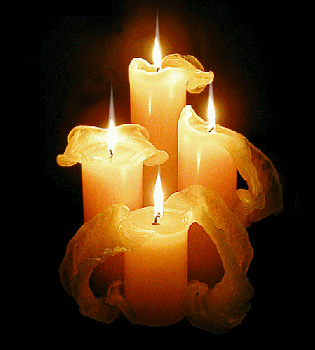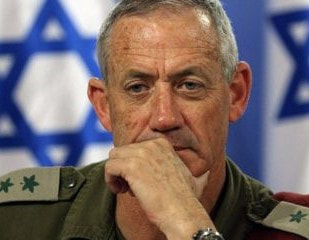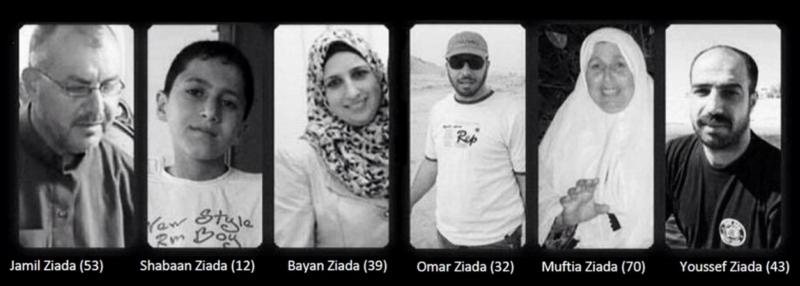18 sept 2019
|
This video shows part of Ziada’s statement in court:
|

Ismail Ziada is suing two Israeli generals for the deaths of six relatives during Israel’s 2014 attack on Gaza
As Israelis went to the polls on Tuesday, one of the leading candidates for prime minister was fending off war crimes accusations in a court in The Hague. Palestinian-Dutch citizen Ismail Ziada is seeking justice for Israel’s killing of six members of his family during its 2014 assault on Gaza. Ziada holds Benny Gantz, the Israeli army chief at the time, and Amir Eshel, then the air force chief, responsible for the decision to bomb his family’s home in al-Bureij refugee camp. |
The 20 July bombing that year reduced the three-floor building to rubble, killing Ziada’s 70-year-old mother Muftia Ziada, his brothers Jamil, Yousif and Omar, sister-in-law Bayan, and 12-year-old nephew Shaban.
A seventh person visiting the family was also killed.
Ziada is suing the Israeli generals for more than $600,000 in damages plus court costs.
Gantz is now leader of Israel’s Blue and White coalition. After this week’s inconclusive election result, he is seeking the support of other parties to put together a government.
In Tuesday’s session, the Dutch court heard arguments about whether it has jurisdiction over the case.
Lawyers for Gantz and Eshel tried to frame Ziada’s legal action as part of “an anti-Israel campaign.”
Earlier this year, Israel urged the Dutch court to dismiss the war crimes case against Gantz.
Pressure
In the run-up to the hearing, Ziada’s family faced tremendous pressure.
The brakes of the family car were sabotaged last December, but a police investigation provided no leads.
A few months later, Ziada’s wife Angélique Eijpe was publicly attacked by the Israel lobby organization CIDI.
She was falsely accused of seeking to “end Jewish democracy” in her work for the One State Foundation.
CIDI also parroted Israeli claims that the bombing of the Ziada family house was justified.
Shortly before the hearing, Twitter suspended the account of the Palestine Justice Campaign, which supports Ziada’s legal action.
The social media company alleged an unspecified “breach of rules.”
Twitter did not respond to requests for clarification from the campaign.
Bragging about killing
Many journalists, friends and supporters of Ziada attended the court hearing. The Israeli generals were not present, but were represented by lawyers.
The Ziada house was attacked during Israel’s 51-day assault on Gaza which killed 2,251 Palestinians, including 1,462 civilians, among them 551 children, according to an independent investigation commissioned by the UN Human Rights Council .
More than 11,000 Palestinians were injured, the majority women and children.
Ziada’s lawyers, human rights and war crimes experts Liesbeth Zegveld and Lisa-Marie Komp, argue that the attack on the Ziada home was part of Israel’s “policy to bomb civilian residential buildings” in “breach of international humanitarian law.”
Gantz and Eshel were among the top leaders who “designed the policy of bombing residential buildings” and are “fully responsible for the decision to bomb the Ziada family residence,” they allege in the complaint.
The independent UN investigation supports Zegveld and Komp’s view.
On Tuesday, Ziada’s lawyers showed the court Gantz’s election campaign video bragging about how much killing and destruction he perpetrated in Gaza.
The court must decide whether Ziada’s case is admissible after the generals’ lawyers claimed last November that their clients enjoy immunity.
They also assert that the Dutch court has no jurisdiction because they claim that Ziada could seek justice in Israel.
Israeli retaliation?
Gantz and Eshel were represented by a team by five lawyers, an indication that Israel will spare no expense trying to shield its generals from accountability.
While the Israeli government is paying the generals’ legal fees, Ziada’s supporters donated money via a crowdfunding campaign to support his case.
The generals’ brief argues that Ziada’s case is an effort to put Israel’s judicial system in the “suspect’s bench.”
They assert that the case “seems to be primarily a means of creating a stage for an anti-Israel campaign” – a standard Israeli government talking point.
But Ziada’s lawyers provided many examples to support their claim that the Dutch court has jurisdiction over the case.
The law in the Netherlands [pdf] allows the country’s courts to exercise universal jurisdiction over genocide, crimes against humanity and war crimes perpetrated elsewhere when a Dutch national cannot obtain justice in the country where the crimes were committed.
Gantz and Eshel’s lawyers dismissed the evidence offered by Zegveld about how Israel’s legal system discriminates against Palestinians.
They asserted that UN investigations should be taken with “a pinch of salt.”
Rather than address substance, they blasted the UN Human Rights Council as “notoriously anti-Israel.”
The lawyers also warned the court that acceptance of jurisdiction may have “diplomatic consequences” – likely a warning of Israeli retaliation.
But Dutch courts are independent and should not take political considerations and attempts at intimidation into account.
No accountability, no justice
In his statement [pdf] to the court, Ziada provided the context of his quest for justice.
He emphasized the lack of accountability for Israel’s crimes.
Ziada told the court that his experience with Israeli violence started long before 2014.
While still a child he was shot in the head at close range with a rubber-coated metal bullet and in the leg with live ammunition.
He also witnessed another child being shot dead with a bullet to his head.
“Enemy subjects”
Hussein Abu Hussein, a Palestinian lawyer who has defended many Palestinians in Israeli courts, testified at the hearing.
He told [pdf] the court that practical and legal obstacles make it impossible for Ziada to seek justice in Israel.
In 2014, Israel declared the Gaza Strip “enemy territory” and its residents “enemy subjects.”
As a result, Israel denies liability for harm it causes to Palestinians in the Gaza Strip, Abu Hussein explained.
If Ziada tried to claim damages in an Israeli court, he would be seen as a representative of the family in Gaza and thus as an “enemy subject” despite his Dutch nationality, Abu Hussein added.
Amendments to Israeli law also expand the immunity Israel claims for damages caused during “wartime action.”
Ziada told the court that he compares his fight for justice with the parable of David and Goliath.
“Those on the other end representing Goliath, and me, David – holding my head high and convinced of doing the right thing.”
The court will announce its ruling on whether the case can proceed in January.
In the meantime, Ziada and his supporters will be hoping that the Netherlands provides a path to justice that has so far been denied.
Accounting for War Crimes in Gaza
A seventh person visiting the family was also killed.
Ziada is suing the Israeli generals for more than $600,000 in damages plus court costs.
Gantz is now leader of Israel’s Blue and White coalition. After this week’s inconclusive election result, he is seeking the support of other parties to put together a government.
In Tuesday’s session, the Dutch court heard arguments about whether it has jurisdiction over the case.
Lawyers for Gantz and Eshel tried to frame Ziada’s legal action as part of “an anti-Israel campaign.”
Earlier this year, Israel urged the Dutch court to dismiss the war crimes case against Gantz.
Pressure
In the run-up to the hearing, Ziada’s family faced tremendous pressure.
The brakes of the family car were sabotaged last December, but a police investigation provided no leads.
A few months later, Ziada’s wife Angélique Eijpe was publicly attacked by the Israel lobby organization CIDI.
She was falsely accused of seeking to “end Jewish democracy” in her work for the One State Foundation.
CIDI also parroted Israeli claims that the bombing of the Ziada family house was justified.
Shortly before the hearing, Twitter suspended the account of the Palestine Justice Campaign, which supports Ziada’s legal action.
The social media company alleged an unspecified “breach of rules.”
Twitter did not respond to requests for clarification from the campaign.
Bragging about killing
Many journalists, friends and supporters of Ziada attended the court hearing. The Israeli generals were not present, but were represented by lawyers.
The Ziada house was attacked during Israel’s 51-day assault on Gaza which killed 2,251 Palestinians, including 1,462 civilians, among them 551 children, according to an independent investigation commissioned by the UN Human Rights Council .
More than 11,000 Palestinians were injured, the majority women and children.
Ziada’s lawyers, human rights and war crimes experts Liesbeth Zegveld and Lisa-Marie Komp, argue that the attack on the Ziada home was part of Israel’s “policy to bomb civilian residential buildings” in “breach of international humanitarian law.”
Gantz and Eshel were among the top leaders who “designed the policy of bombing residential buildings” and are “fully responsible for the decision to bomb the Ziada family residence,” they allege in the complaint.
The independent UN investigation supports Zegveld and Komp’s view.
On Tuesday, Ziada’s lawyers showed the court Gantz’s election campaign video bragging about how much killing and destruction he perpetrated in Gaza.
The court must decide whether Ziada’s case is admissible after the generals’ lawyers claimed last November that their clients enjoy immunity.
They also assert that the Dutch court has no jurisdiction because they claim that Ziada could seek justice in Israel.
Israeli retaliation?
Gantz and Eshel were represented by a team by five lawyers, an indication that Israel will spare no expense trying to shield its generals from accountability.
While the Israeli government is paying the generals’ legal fees, Ziada’s supporters donated money via a crowdfunding campaign to support his case.
The generals’ brief argues that Ziada’s case is an effort to put Israel’s judicial system in the “suspect’s bench.”
They assert that the case “seems to be primarily a means of creating a stage for an anti-Israel campaign” – a standard Israeli government talking point.
But Ziada’s lawyers provided many examples to support their claim that the Dutch court has jurisdiction over the case.
The law in the Netherlands [pdf] allows the country’s courts to exercise universal jurisdiction over genocide, crimes against humanity and war crimes perpetrated elsewhere when a Dutch national cannot obtain justice in the country where the crimes were committed.
Gantz and Eshel’s lawyers dismissed the evidence offered by Zegveld about how Israel’s legal system discriminates against Palestinians.
They asserted that UN investigations should be taken with “a pinch of salt.”
Rather than address substance, they blasted the UN Human Rights Council as “notoriously anti-Israel.”
The lawyers also warned the court that acceptance of jurisdiction may have “diplomatic consequences” – likely a warning of Israeli retaliation.
But Dutch courts are independent and should not take political considerations and attempts at intimidation into account.
No accountability, no justice
In his statement [pdf] to the court, Ziada provided the context of his quest for justice.
He emphasized the lack of accountability for Israel’s crimes.
Ziada told the court that his experience with Israeli violence started long before 2014.
While still a child he was shot in the head at close range with a rubber-coated metal bullet and in the leg with live ammunition.
He also witnessed another child being shot dead with a bullet to his head.
“Enemy subjects”
Hussein Abu Hussein, a Palestinian lawyer who has defended many Palestinians in Israeli courts, testified at the hearing.
He told [pdf] the court that practical and legal obstacles make it impossible for Ziada to seek justice in Israel.
In 2014, Israel declared the Gaza Strip “enemy territory” and its residents “enemy subjects.”
As a result, Israel denies liability for harm it causes to Palestinians in the Gaza Strip, Abu Hussein explained.
If Ziada tried to claim damages in an Israeli court, he would be seen as a representative of the family in Gaza and thus as an “enemy subject” despite his Dutch nationality, Abu Hussein added.
Amendments to Israeli law also expand the immunity Israel claims for damages caused during “wartime action.”
Ziada told the court that he compares his fight for justice with the parable of David and Goliath.
“Those on the other end representing Goliath, and me, David – holding my head high and convinced of doing the right thing.”
The court will announce its ruling on whether the case can proceed in January.
In the meantime, Ziada and his supporters will be hoping that the Netherlands provides a path to justice that has so far been denied.
Accounting for War Crimes in Gaza
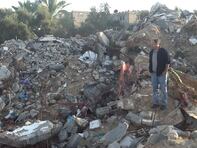
Saad Ziada standing on the ruins of his home where 6 family members from 3 generations were killed in an Israeli attack
Latest Update: Ismail Ziada’s opening statement as delivered in court [pdf]
Court hearing on 17th September concluded – details here
On July 20th 2014 the Ziada family home in Bureij refugee camp in Gaza was bombed by Israeli military forces. It was a targeted attack that reduced the three storey building instantly to rubble and left everyone inside it fatally wounded. Amongst the dead lay Ismail Ziada’s mother, three brothers, his sister-in-law, a 12 year old nephew and a visiting friend.
Over 2,000 Palestinians were killed by the Israeli Defence Forces (IDF) during “Operation Protective Edge”. The vast majority were non-combattants and over a quarter of all people killed in the operation were children under eighteen years of age.
In the fall of that same year Ismail Ziada, a Dutch citizen resident in the Netherlands, contacted Liesbeth Zegveld, a prominent lawyer, specializing in support for victims of war crimes and human rights violations. Ziada was committed to holding those responsible for the killing of his family accountable.
The original suggestion of initiating a criminal case was soon put to one side as previous experience indicated that it was highly unlikely that the public prosecutor would initiate criminal proceedings. However, Zegveld pointed out that the Netherlands upholds a system of universal jurisdiction in civil proceedings for Dutch citizens who are unable to gain access to justice elsewhere.
Latest Update: Ismail Ziada’s opening statement as delivered in court [pdf]
Court hearing on 17th September concluded – details here
On July 20th 2014 the Ziada family home in Bureij refugee camp in Gaza was bombed by Israeli military forces. It was a targeted attack that reduced the three storey building instantly to rubble and left everyone inside it fatally wounded. Amongst the dead lay Ismail Ziada’s mother, three brothers, his sister-in-law, a 12 year old nephew and a visiting friend.
Over 2,000 Palestinians were killed by the Israeli Defence Forces (IDF) during “Operation Protective Edge”. The vast majority were non-combattants and over a quarter of all people killed in the operation were children under eighteen years of age.
In the fall of that same year Ismail Ziada, a Dutch citizen resident in the Netherlands, contacted Liesbeth Zegveld, a prominent lawyer, specializing in support for victims of war crimes and human rights violations. Ziada was committed to holding those responsible for the killing of his family accountable.
The original suggestion of initiating a criminal case was soon put to one side as previous experience indicated that it was highly unlikely that the public prosecutor would initiate criminal proceedings. However, Zegveld pointed out that the Netherlands upholds a system of universal jurisdiction in civil proceedings for Dutch citizens who are unable to gain access to justice elsewhere.
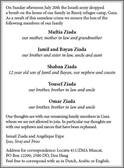
Death notice de Volksrant newspaper, 26th July 2014
Ziada had reservations about taking the civil route as financial compensation could never be any consolation for the loss of family members. However, after careful consideration it was agreed to pursue the civil trajectory with the aim of getting some form of accountability in place and establishing a precedent that could also benefit others and hopefully prevent further Israeli war crimes.
Papers were served on both the Chief of General Staff of the IDF at the time of the bombing, Benny Gantz and the Commander of the IDF Air Force, Amir Eshel. Both officers have since retired and Gantz has formed a new political party “Hosen Yisrael” (Israel Resilience Party) which is currently vying with Israeli Prime Minister Benjamin Netanyahu’s party Likud for the title of most popular party in Israel.
The original working assumption was that neither officer would respond to the writ and the court proceedings would take place in absentia. However, just before the 3 month time period for submission of a response expired, both Israeli military officers appointed a lawyer to represent them. In November 2018, they finally submitted a response.
While the Ziada writ was focused on the fact that the bombing of the family home was illegal and a war crime according to international law, the response of the defendants focused exclusively on their alleged right to immunity and the Dutch court’s alleged lack of jurisdiction based on the argument that Ismail Ziada would have access to justice in Israel.
Israeli court ruling against Dr Izzeldin Abuelaish, who filed a compensation suit against the Israeli state over the killing of three of his daughters in IDF shelling in 2009 is proof, if proof were needed, that this is most certainly not the case.
A court hearing on 17th September 2019 was the first time the court actually considered the issues. The panel of judges will now consider the case before making a public pronouncement on January 29th 2020. Information relating to the court hearing is available here in 5 languages.
Should the outcome be positive for Ismail Ziada it is now expected the Israeli military defendants will pursue the case up to the Dutch Supreme Court which can take several years and significant financial resources.
Ziada had reservations about taking the civil route as financial compensation could never be any consolation for the loss of family members. However, after careful consideration it was agreed to pursue the civil trajectory with the aim of getting some form of accountability in place and establishing a precedent that could also benefit others and hopefully prevent further Israeli war crimes.
Papers were served on both the Chief of General Staff of the IDF at the time of the bombing, Benny Gantz and the Commander of the IDF Air Force, Amir Eshel. Both officers have since retired and Gantz has formed a new political party “Hosen Yisrael” (Israel Resilience Party) which is currently vying with Israeli Prime Minister Benjamin Netanyahu’s party Likud for the title of most popular party in Israel.
The original working assumption was that neither officer would respond to the writ and the court proceedings would take place in absentia. However, just before the 3 month time period for submission of a response expired, both Israeli military officers appointed a lawyer to represent them. In November 2018, they finally submitted a response.
While the Ziada writ was focused on the fact that the bombing of the family home was illegal and a war crime according to international law, the response of the defendants focused exclusively on their alleged right to immunity and the Dutch court’s alleged lack of jurisdiction based on the argument that Ismail Ziada would have access to justice in Israel.
Israeli court ruling against Dr Izzeldin Abuelaish, who filed a compensation suit against the Israeli state over the killing of three of his daughters in IDF shelling in 2009 is proof, if proof were needed, that this is most certainly not the case.
A court hearing on 17th September 2019 was the first time the court actually considered the issues. The panel of judges will now consider the case before making a public pronouncement on January 29th 2020. Information relating to the court hearing is available here in 5 languages.
Should the outcome be positive for Ismail Ziada it is now expected the Israeli military defendants will pursue the case up to the Dutch Supreme Court which can take several years and significant financial resources.
|
|
The Ziada family has been using their own personal funds and some generous contributions from friends and supporters to pursue their case on behalf of all the victims of Israeli war crimes.
Last year Roger Waters gave our fundraiser a major boost in a magnificent gesture of solidarity. If justice Is to be gained for the Palestinian victims, the case needs our moral and financial support. The case being taken by the Ziadas has a real chance of a providing a major breakthrough and the establishment of a legal precedent that will benefit other Palestinians and hopefully prevent further Israeli war crimes. |
It is important for the family to stress that this legal action is not being taken for personal gain. Should it be successful, any compensation received will be dedicated to a specially established fund for Palestinian war crime victims in general and children in particular.
Every donation large or small helps the Ziada family struggle for justice for the Palestinian people. Please contribute what you can and encourage others to do the same.
All funds raised will be transferred directly to the law firm instructed in the case, Prakken d’Oliveira Human Rights lawyers in Amsterdam.
Every donation large or small helps the Ziada family struggle for justice for the Palestinian people. Please contribute what you can and encourage others to do the same.
All funds raised will be transferred directly to the law firm instructed in the case, Prakken d’Oliveira Human Rights lawyers in Amsterdam.

Attention will now focus on President, Reuven Rivlin, who will choose the candidate he believes has the best chance of forming a stable coalition, but if that doesn’t work, new elections would be triggered yet again
Prime Minister Benjamin Netanyahu fell short of securing a parliamentary majority with his natural religious and nationalist allies in national elections Tuesday, partial results indicated, setting the stage for a period of coalition negotiations that could threaten his political future and even clear the way for him to be tried on corruption charges.
Initial partial results showed challenger Benny Gantz’s centrist Blue and White party tied with Netanyahu’s Likud.
While the results do not guarantee that Gantz will be the next prime minister, they signaled that Netanyahu, who has led the country for over 10 years, could have trouble holding on to the job.
Addressing his supporters early Wednesday, Netanyahu refused to concede defeat and vowed to work to form a new government that excludes Arab parties.
His campaign focused heavily on attacking and questioning the loyalty of the country’s Arab minority — a strategy that drew accusations of racism and incitement from Arab leaders.
“In the coming days we will convene negotiations to assemble a strong Zionist government and to prevent a dangerous anti-Zionist government,” he said. He claimed that Arab parties “negate the existence of Israel as a Jewish and democratic state” and “glorify bloodthirsty murderers.”
Final results are expected Wednesday and could still swing in Netanyahu’s favor.
According to the partial results, the parties of Gantz and Netanyahu received 32 seats each in the 120-member parliament. Likud with its natural allies of religious and ultra-nationalist parties mustered 56 seats — or five short of the needed majority.
This means both Likud and Blue and White will have difficulty setting up a governing coalition without the support of Avigdor Liberman’s Yisrael Beiteinu party.
That put Liberman, a former protege of Netanyahu’s who has become one of the prime minister’s fiercest rivals, in the position of kingmaker.
Arab parties, which have never before sat in an Israeli government, also finished strong, and exit polls predicted they would form the third-largest party in parliament.
Addressing his supporters late Tuesday, a jubilant Liberman said he saw only “one option”: a broad, secular coalition with both Blue and White and Likud.
“We’ve always said that a unity government is only possible in emergency situations" Liberman said and added "I tell every citizen today watching us on television: the situation, both security-wise and economically, are emergency situations,”concluding. “The country, therefore, requires a broad government.”
Early Wednesday, Gantz told a cheering rally of supporters that while it was too soon to declare victory, he had begun speaking to potential partners and hoped to form a unity government.
“Starting tonight we will work to form a broad unity government that will express the will of the people,” he said.
Attention will now focus on President, Reuven Rivlin, who is to choose the candidate he believes has the best chance of forming a stable coalition. Rivlin is to consult with all parties in the coming days before making his decision.
After that, the prime minister designate would have up to six weeks to form a coalition. If that fails, Rivlin could give another candidate for prime minister 28 days to form a coalition.
And if that doesn’t work, new elections would be triggered yet again. Rivlin has said he will do everything possible to avoid such a scenario.
Election Tally: Likud and Blue White Win 32 Seats Each
Unofficial results of the 22nd Knesset elections showed that the Likud party of incumbent prime minister Benjamin Netanyahu and the centrist White and Blue party, of opposer Benny Gantz, won 32 seats each, while the joint list received 13.
At this time, 92% of the votes have been counted.
Netanyahu, who is Israel’s longest-serving prime minister since July, is seeking a record fifth term in office. However, the first round of exit polls show that Netanyahu’s right-wing coalition bloc could not secure the 61-seat majority they needed.
The results indicate a draw between the right-wing camp with 56 seats and the center-left camp with 55 seats, without the Yisrael Beiteinu party which won 9 seats, PNN reports.
These results make it difficult for Netanyahu and his opponent Gantz to form a government separately. Avigdor Lieberman is calling for a unity government in order to avoid the possibility of a third election.
Gantz said, to his supporters, on Wednesday morning, that “it is necessary to wait for the official results”, according to Al Jazeera. “Netanyahu has not been successful in what he set out to do. We have proved that the idea is Blue and White; that we established a little over a year ago was successful and is here to stay.”
The results came after counting 4055,141 votes, while the Israeli Election Commission postponed the announcement of the official preliminary results, which was scheduled on Wednesday noon, due to the change in the way the data is checked and entered into the website of the Commission.
Prime Minister Benjamin Netanyahu fell short of securing a parliamentary majority with his natural religious and nationalist allies in national elections Tuesday, partial results indicated, setting the stage for a period of coalition negotiations that could threaten his political future and even clear the way for him to be tried on corruption charges.
Initial partial results showed challenger Benny Gantz’s centrist Blue and White party tied with Netanyahu’s Likud.
While the results do not guarantee that Gantz will be the next prime minister, they signaled that Netanyahu, who has led the country for over 10 years, could have trouble holding on to the job.
Addressing his supporters early Wednesday, Netanyahu refused to concede defeat and vowed to work to form a new government that excludes Arab parties.
His campaign focused heavily on attacking and questioning the loyalty of the country’s Arab minority — a strategy that drew accusations of racism and incitement from Arab leaders.
“In the coming days we will convene negotiations to assemble a strong Zionist government and to prevent a dangerous anti-Zionist government,” he said. He claimed that Arab parties “negate the existence of Israel as a Jewish and democratic state” and “glorify bloodthirsty murderers.”
Final results are expected Wednesday and could still swing in Netanyahu’s favor.
According to the partial results, the parties of Gantz and Netanyahu received 32 seats each in the 120-member parliament. Likud with its natural allies of religious and ultra-nationalist parties mustered 56 seats — or five short of the needed majority.
This means both Likud and Blue and White will have difficulty setting up a governing coalition without the support of Avigdor Liberman’s Yisrael Beiteinu party.
That put Liberman, a former protege of Netanyahu’s who has become one of the prime minister’s fiercest rivals, in the position of kingmaker.
Arab parties, which have never before sat in an Israeli government, also finished strong, and exit polls predicted they would form the third-largest party in parliament.
Addressing his supporters late Tuesday, a jubilant Liberman said he saw only “one option”: a broad, secular coalition with both Blue and White and Likud.
“We’ve always said that a unity government is only possible in emergency situations" Liberman said and added "I tell every citizen today watching us on television: the situation, both security-wise and economically, are emergency situations,”concluding. “The country, therefore, requires a broad government.”
Early Wednesday, Gantz told a cheering rally of supporters that while it was too soon to declare victory, he had begun speaking to potential partners and hoped to form a unity government.
“Starting tonight we will work to form a broad unity government that will express the will of the people,” he said.
Attention will now focus on President, Reuven Rivlin, who is to choose the candidate he believes has the best chance of forming a stable coalition. Rivlin is to consult with all parties in the coming days before making his decision.
After that, the prime minister designate would have up to six weeks to form a coalition. If that fails, Rivlin could give another candidate for prime minister 28 days to form a coalition.
And if that doesn’t work, new elections would be triggered yet again. Rivlin has said he will do everything possible to avoid such a scenario.
Election Tally: Likud and Blue White Win 32 Seats Each
Unofficial results of the 22nd Knesset elections showed that the Likud party of incumbent prime minister Benjamin Netanyahu and the centrist White and Blue party, of opposer Benny Gantz, won 32 seats each, while the joint list received 13.
At this time, 92% of the votes have been counted.
Netanyahu, who is Israel’s longest-serving prime minister since July, is seeking a record fifth term in office. However, the first round of exit polls show that Netanyahu’s right-wing coalition bloc could not secure the 61-seat majority they needed.
The results indicate a draw between the right-wing camp with 56 seats and the center-left camp with 55 seats, without the Yisrael Beiteinu party which won 9 seats, PNN reports.
These results make it difficult for Netanyahu and his opponent Gantz to form a government separately. Avigdor Lieberman is calling for a unity government in order to avoid the possibility of a third election.
Gantz said, to his supporters, on Wednesday morning, that “it is necessary to wait for the official results”, according to Al Jazeera. “Netanyahu has not been successful in what he set out to do. We have proved that the idea is Blue and White; that we established a little over a year ago was successful and is here to stay.”
The results came after counting 4055,141 votes, while the Israeli Election Commission postponed the announcement of the official preliminary results, which was scheduled on Wednesday noon, due to the change in the way the data is checked and entered into the website of the Commission.
